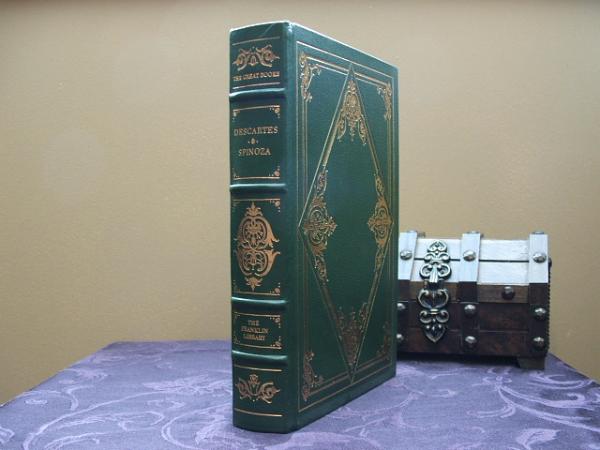Easton Press René Descartes books
Discourse on Method - 1992
Writings of René Descartes - Library of The Great Philosophers
Franklin Library René Descartes books
Philosophical works of René Descartes - 100 Greatest Books of All Time - 1981
René Descartes and Spinoza - Great Books of the Western World - 1982
René Descartes biography
René Descartes, born on March 31, 1596, in La Haye en Touraine, Kingdom of France, was a renowned French philosopher, mathematician, and scientist. Often hailed as the "Father of Modern Philosophy," Descartes made groundbreaking contributions to various fields, including mathematics and metaphysics, and his work laid the foundation for the scientific revolution of the 17th century. Descartes received a Jesuit education at the Collège Royal Henry-Le-Grand and later studied law at the University of Poitiers. However, his true passion lay in mathematics and philosophy. In 1618, he enlisted in the Dutch States Army, and it was during this time that he began to develop his method of systematic doubt and his famous statement, "Cogito, ergo sum" (I think, therefore I am).
In his seminal work, Meditations on First Philosophy (1641), Descartes set out to establish a secure foundation for knowledge by doubting everything that could possibly be doubted. He aimed to arrive at certain knowledge through reason and deduction. His skeptical approach led him to the conclusion that while everything could be doubted, the act of doubt itself proved the existence of a thinking, conscious self. Apart from philosophy, Descartes made significant contributions to mathematics, introducing Cartesian coordinates and laying the groundwork for analytical geometry. His work Discourse on the Method (1637) outlined his mathematical ideas and provided a systematic approach to problem-solving. Descartes' philosophy had a profound impact on the scientific method, emphasizing the importance of reason and mathematical rigor in the pursuit of knowledge. However, his views also sparked controversies, particularly his mind-body dualism, which posited a separation between the immaterial mind and the material body.
Throughout his life, Descartes faced opposition from both religious and philosophical circles. His work Principles of Philosophy (1644) aimed to reconcile his ideas with traditional Scholastic philosophy, but it did not completely mitigate the controversies surrounding his views. René Descartes spent the latter part of his life in various European cities, including Stockholm, where he served as a tutor to Queen Christina of Sweden. He died on February 11, 1650, in Stockholm. Despite the controversies surrounding his ideas, Descartes' legacy endures, and his contributions to philosophy and mathematics continue to shape the way we approach knowledge and scientific inquiry.
Discourse on Method
Rene Descartes has often been called the father of modern philosophy, and it is certainly true that his influence has pervaded western thought at least until the present century. The "Discourse" is the exposition of the famous "Method" by which this brilliant mathematician tried to apply mathematical methods to and thus to discover mathematical certainties in all fields of human inquiry. Starting from universal doubt he passes, via the celebrated phrase "cogito ergo sum" to the certainty of the existence of God and hence of the reality of created nature.
Philosophical Works
Descartes was prepared to go to any lengths in his search for certainty even to deny those things that seemed most self-evident. In his Meditations of 1641, and in the Objections and Replies that were included with the original publication, he set out to dismantle and then reconstruct the idea of the individual self and its existence. In doing so, Descartes developed a language of subjectivity that has lasted to this day and also took his first steps towards the view that would eventually be expressed in the epigram Cogito, ergo sum ('I think, therefore I am'), one of modern philosophy's most famous and most fiercely controversial claims.
Unlike the medieval philosophers who often began by examining the existence and nature of God in a spirit of faith, Descartes begins by reflecting upon himself as one who doubts but who nonetheless desires certain knowledge of God and the world. In setting forth the truths he discovers, Descartes hoped that his "Principles of Philosophy" would provide a new basis for human knowledge and, most especially, a new footing for scientific inquiry."

Comments
Post a Comment
Share your best book review and recommendation